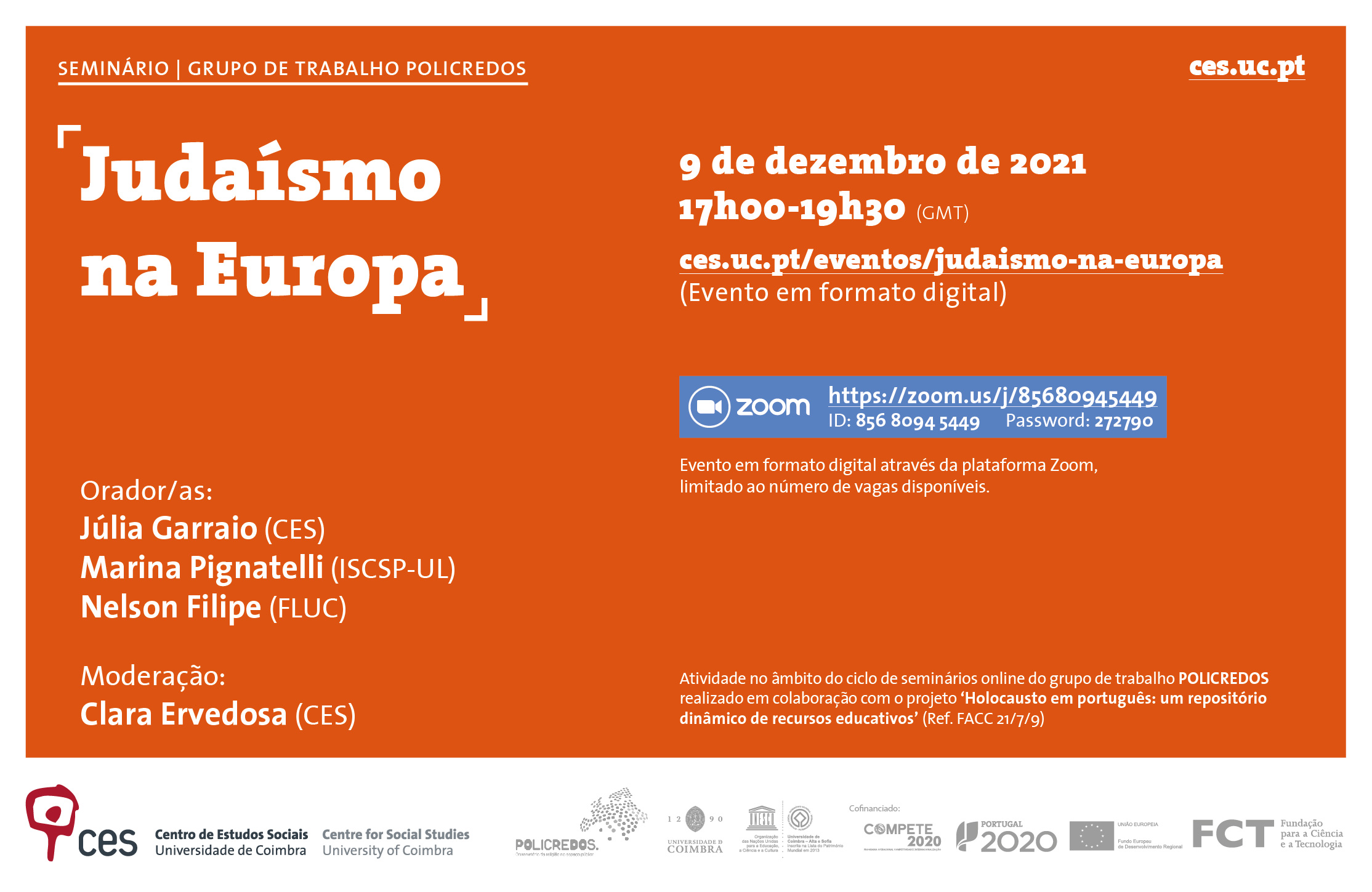POLICREDOS - Religions and Society
SEMINAR| POLICREDOS WORKING GROUP
Judaism in Europe
Júlia Garraio
Marina Pignatelli
Nelson Filipe
December 9, 2021, 17h00-19h30
Online event
Programme
Under the second Policredos Working Group webinars series, this seminar, dedicated to Judaism in Europe, will present case studies referring to historical situations following antisemitic persecutions and extermination policies carried out in the European continent, namely by the Portuguese Inquisition and the Holocaust. The three case studies intend to advance a debate on the politics of memory and the place of Judaism in European identities.
Programme
Some Traces of (Crypto)Judaism in Northeast Transmontano, by Marina Pignatelli (ISCSP-UL)
Almost three centuries of Inquisition have destroyed practically all traces of Jewish life in Portugal. Starting from the hypothesis that some traces of that presence may have survived until the present day, an ethnographic study, initiated in the district of Bragança, was launched to look into traces of Jewish (crypto)culture that subsist in contemporaneity. "Jewish facts" associated to the memory and to a presence that still remains today in that region will be approached. Such data became known through anthropological research, based on the search for documentary data that complemented participant observation, during which in-depth interviews, informal conversations and direct observations were conducted. It was thus possible to confirm the initial hypothesis, since the data collected made it possible to attest that practices and customs subsist among present-day Brigantines, in addition to the memory of a past Jewish presence.
German Jews in the memories of the escape and expulsion, by Júlia Garraio (CES)
Flucht und Vertreibung [Escape and Expulsion], name used for the forced migration of millions of Germans to the West at the end of the Second World War and in the context of the redefinition of borders that followed the conflict, corresponds to one of the most controversial places of memory in German culture. This presentation will highlight its role in the (re)construction of German identity in the Federal Republic of Germany in the 1950s. By analysing, on the one hand, the (non)presence of German Jews in an important federal oral history project of the FRG on Flucht und Vertreibung and in various memoirs published at the time and, on the other hand, the Christian imaginaries that pervade the memories of these events, the implications of adopting this event as emblematic of German suffering in the war will be discussed.
Imagetics of Jewish identity in the poetry of Nelly Sachs, by Nelson Filipe (FLUC)
Nelly Sachs' escape from Nazi Germany to Sweden in 1940 gave rise to a reinvention of her writing. If, until the period of persecution and threat, the Jewish dimension had been relatively absent, it later came not only to be assimilated, but also to play a permanent role in the author's work and life. After a brief presentation of the life and work of Nelly Sachs, some of her poems will be used to show how they represent a certain ethos of Jewish identity after the extermination period. Through interconnections between strong imagery - such as the terrestrial (sand, wind, sea) and the cosmic (stars, planets) - Sachs' poetry invites reflection on the Holocaust, the experience of exile and the limits of its representations.
Moderator: Clara Ervedosa (CES)
Bio notes
Marina Pignatelli Marina Pignatelli is an associate professor at ISCSP-University of Lisbon. She holds a PhD in Social Sciences in the specialty of Anthropology and a Master's degree in Anthropological Sciences from the University of Lisbon, ISCSP, where she teaches. She has completed post-graduate studies in Ethnology of Religions, Sephardic Studies, Civilian Crisis Management and Intangible Cultural Heritage, and free courses in the area of religion. She is dedicated to the study of the Jewish reality in Portugal since 1991. She is a researcher at CRIA - Research Network Centre in Anthropology, executive coordinator of LEJ-Laboratory of Jewish Studies and member of the board of the Portuguese Association of Anthropology.
Júlia Garraio is a researcher at the Centre for Social Studies (Humanities, Migrations and Peace Studies), integrating the research group Humanities, Migrations and Peace Studies.Co-coordinator of GT-POLICREDOS together with Teresa Toldy and Luciane Lucas Santos. Most of her research, activities and publications were dedicated to the German literature and culture in the 20th and 21st centuries. She is co-founder of the international research group SVAC-Sexual Violence in Armed Conflict (https://warandgender.net/about/). She integrates the International Editorial Board of the European Journal of Women's Studies (https://journals.sagepub.com/editorial-board/EJW). She is a researcher of the project DECODEM(De)Coding Masculinities: Towards an enhanced understanding of media's role in shaping perceptions of masculinities in Portugal.
Nelson Filipe. Concluding his Masters Degree in Cultural Studies, Literature and Modern Languages (FLUC) with a dissertation on representations of memory in the poetry of Nelly Sachs and Manuel António Pina. Research scholarship holder in the project "The Holocaust in Portuguese: a dynamic repository of educational resources" (CES).
Activity under the POLICREDOS workgroup carried out in collaboration with the project Holocaust in Portuguese: a dynamic repository of educational resources
____________________
This activity will be accessible through the Zoom platform and will be limited to number of available places:
https://us02web.zoom.us/j/85680945449?pwd=d2Nja0ZiZWlIWmxiRlM3Q1hIalVXZz09
ID: 856 8094 5449 | Password: 272790
We appreciate that all participants keep the microphone muted until the moment(s) of debate. The host of the session reserves the right to expel the participant who does not respect the rules of the room.
Online open access activities such as this one do not grant a declaration of participation since such document will only be provided in events that provide for prior registration and controlled access.


